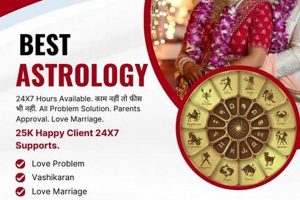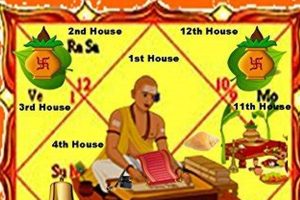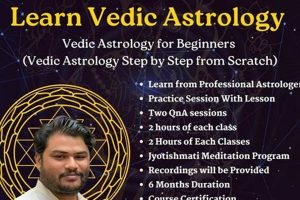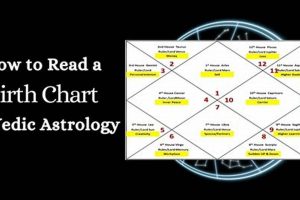The question of astrology’s predictive capabilities, particularly concerning the Vedic tradition, often arises. Vedic astrology, rooted in ancient Indian scriptures, uses planetary positions at the time of birth to generate a natal chart, or horoscope, which is then interpreted to understand an individual’s personality, potential, and life path. An example of this practice would be assessing the placement of Jupiter to understand an individual’s propensity for wisdom, spirituality, and good fortune.
Exploring the validity of such predictions is significant due to the widespread cultural influence of astrological practices. Historically, Vedic astrology has served as a guiding force in major life decisions, from marriage and career choices to auspicious dates for important events. Understanding its purported accuracy is crucial for discerning the potential impact on individuals and societal practices. This exploration can foster critical thinking about the role of tradition and belief systems in shaping lives.
This inquiry naturally leads to a broader examination of various facets of Vedic astrology, including its core principles, methodologies, and interpretations. It also prompts a discussion of the challenges in scientifically validating astrological claims and the perspectives of both adherents and skeptics.
Tips for Approaching Vedic Astrology
When exploring the validity of Vedic astrology, a critical and discerning approach is essential. The following tips offer guidance for navigating this complex subject.
Tip 1: Understand the Basics. Familiarize oneself with the core principles of Vedic astrology, including the zodiac signs, planets, houses, and nakshatras (lunar mansions). This foundational knowledge provides a framework for understanding astrological interpretations.
Tip 2: Consult Reputable Sources. Seek information from experienced and credible Vedic astrologers or scholarly resources. Avoid relying solely on generic online platforms or unqualified practitioners.
Tip 3: Analyze Birth Chart Details. Scrutinize the specific planetary placements and combinations in a birth chart rather than relying on generalized sun sign predictions. The unique configuration of planets provides individualized insights.
Tip 4: Consider Multiple Interpretations. Vedic astrology offers diverse interpretive approaches. Exploring different perspectives can provide a more nuanced understanding of astrological predictions.
Tip 5: Evaluate Predictive Accuracy. Assess the alignment of past predictions with actual life events. This critical evaluation helps discern patterns and potential correlations.
Tip 6: Maintain a Skeptical Mindset. Approach astrological claims with healthy skepticism. Avoid blindly accepting predictions without critical analysis and independent verification.
Tip 7: Focus on Self-Reflection. Use astrological insights as a tool for self-reflection and personal growth, rather than solely relying on them for predicting future events.
By following these guidelines, individuals can develop a more informed and balanced perspective on Vedic astrology. This approach facilitates critical thinking and responsible engagement with astrological practices.
This exploration of Vedic astrology encourages further investigation into the interplay between tradition, belief, and personal experience.
1. Predictive Capacity
Predictive capacity forms a cornerstone in evaluating the validity of Vedic astrology. The central question revolves around whether planetary positions genuinely correlate with life events. This connection is often explored through analyzing the accuracy of past predictions. For example, if a Vedic astrologer predicted a significant career shift based on planetary transits, and the individual subsequently experienced such a shift, this instance might be seen as supporting the predictive capacity. However, isolated incidents do not constitute robust evidence. A rigorous examination requires a larger dataset of predictions and outcomes.
The importance of predictive capacity stems from the practical implications of astrological consultations. Individuals often seek guidance on major life decisions, assuming astrology offers reliable foresight. Understanding the limitations of predictive capacity is crucial for making informed choices. For instance, relying solely on astrological predictions for financial investments, without considering market analysis and risk factors, could lead to unfavorable outcomes. Therefore, discerning the extent to which predictive capacity plays a role in Vedic astrology is essential for responsible application.
Challenges in assessing predictive capacity include the subjective nature of astrological interpretations and the difficulty in establishing clear causal links between planetary positions and human experiences. Further research exploring statistical correlations between astrological predictions and real-world outcomes is necessary. This research would contribute to a more nuanced understanding of the relationship between predictive capacity and the broader question of Vedic astrology’s accuracy.
2. Statistical Validation
Statistical validation plays a crucial role in assessing the accuracy of Vedic astrology. This approach involves systematically analyzing a large dataset of astrological predictions and comparing them with actual outcomes. The goal is to identify statistically significant correlations that might support or refute the claim of astrological accuracy. For example, a research study might examine the correlation between specific planetary placements at birth and career success as defined by objective metrics like income level or job title. If a strong correlation emerges, it could suggest a potential link between astrological factors and real-world outcomes. Conversely, a lack of statistically significant correlations would cast doubt on the predictive validity of the astrological principles being tested.
The importance of statistical validation stems from the need for objective evidence. Anecdotal accounts of accurate predictions, while potentially compelling, are susceptible to confirmation bias and other cognitive biases. Statistical analysis offers a more rigorous and impartial method for evaluating the relationship between astrological factors and life events. For instance, examining a large dataset of birth charts and comparing them with documented health records could potentially reveal correlations between specific planetary configurations and predispositions to certain health conditions. Such findings, if statistically significant, would contribute to a more evidence-based understanding of Vedic astrology’s potential applications.
However, applying statistical validation to Vedic astrology presents several challenges. The complexity of astrological interpretations, with multiple interacting factors, makes it difficult to isolate specific variables for analysis. Furthermore, defining and measuring life outcomes in a quantifiable manner can be subjective and complex. Despite these challenges, statistical validation remains a vital component in exploring the accuracy of Vedic astrology. Continued research utilizing robust statistical methodologies is essential for advancing the understanding of this complex field and separating genuine correlations from chance occurrences or subjective interpretations.
3. Subjectivity in Interpretation
Subjectivity in interpretation significantly impacts assessments of Vedic astrology’s accuracy. While planetary positions and astrological charts offer a seemingly objective framework, the interpretation of these elements relies heavily on the astrologer’s skill, experience, and individual perspective. Different astrologers might interpret the same planetary configuration in varying ways, leading to potentially divergent predictions. For example, one astrologer might interpret a particular planetary alignment as indicating a period of financial prosperity, while another might interpret the same alignment as signifying a time of spiritual growth and introspection. This interpretive variability introduces a layer of subjectivity that can influence the perceived accuracy of astrological readings. Even with identical birth chart details, differing interpretations can lead to contrasting predictions, impacting the perceived accuracy of the practice.
This subjectivity poses a fundamental challenge to validating Vedic astrology’s accuracy through empirical means. If interpretations are inherently subjective, establishing consistent and measurable criteria for evaluating predictions becomes difficult. Consider the example of predicting career changes. One astrologer might define a “career change” as a complete shift in profession, while another might consider a promotion within the same field a “career change.” These differing interpretations complicate attempts to assess predictive accuracy. Furthermore, cultural context and individual biases can further influence interpretations. An astrologer raised in a culture that emphasizes entrepreneurial pursuits might be more inclined to interpret planetary positions as favoring business ventures, even if other interpretations are equally valid. This inherent subjectivity underscores the complexity of determining whether apparent inaccuracies stem from flaws in the astrological system itself or from variations in interpretation.
Understanding the role of subjectivity in Vedic astrology highlights the importance of critical evaluation. Individuals seeking astrological guidance should be aware that interpretations can vary, and it’s beneficial to seek multiple perspectives. Focusing on self-reflection and personal growth, rather than solely relying on predictions, can be a more constructive approach. While some might view subjectivity as a weakness, others see it as a strength, allowing for nuanced and personalized insights. Ultimately, acknowledging the inherent subjectivity in interpretation fosters a more informed and balanced approach to understanding and utilizing Vedic astrology. Further research exploring the impact of interpretive variability on predictive accuracy is essential for advancing the ongoing discussion surrounding Vedic astrology’s validity.
4. Cultural Context
Cultural context significantly influences interpretations and perceptions of Vedic astrology’s accuracy. Understanding the cultural backdrop within which Vedic astrology developed and continues to be practiced is crucial for evaluating its purported predictive capabilities. Cultural nuances shape not only how astrological charts are interpreted but also the very expectations surrounding astrology’s role in individual lives and societal practices. This exploration delves into the multifaceted interplay between culture and Vedic astrology.
- Astrology and Rituals
Vedic astrology is deeply intertwined with various cultural rituals and ceremonies in many parts of India and other regions where Vedic traditions are prevalent. From selecting auspicious dates for weddings and other significant life events to performing specific rituals based on planetary positions, astrology plays an integral role in shaping cultural practices. For example, the practice of matching birth charts (Kundali Milan) before marriage is common in some cultures, reflecting the belief that astrological compatibility influences marital harmony. This integration of astrology into cultural rituals raises questions about the extent to which perceived accuracy is influenced by cultural reinforcement and the psychological comfort derived from adhering to traditional practices.
- Traditional Beliefs and Values
Vedic astrology reflects and reinforces specific traditional beliefs and values related to karma, dharma, and reincarnation. The interpretation of planetary positions often draws upon these philosophical concepts, shaping the understanding of an individual’s destiny and life path. For example, challenging life circumstances might be interpreted as the result of past karma, while favorable planetary placements could be seen as indicative of adherence to dharma. These culturally embedded beliefs influence how individuals perceive the accuracy of astrological predictions, often attributing life events to astrological influences rather than other factors. This intricate interplay between traditional beliefs and astrological interpretations necessitates careful consideration when evaluating the validity of astrological claims.
- Transmission of Astrological Knowledge
The transmission of astrological knowledge across generations within families and through traditional lineages plays a significant role in maintaining cultural continuity. This often involves oral transmission and apprenticeship-based learning, which can introduce variations in interpretation and practice. Different astrological schools or traditions might emphasize particular aspects of Vedic astrology, leading to divergent interpretations of the same planetary configurations. For instance, one lineage might prioritize predictive techniques, while another might focus on remedial measures. This diversity in the transmission of knowledge complicates attempts to assess the universal accuracy of Vedic astrological principles.
- Modern Adaptations and Interpretations
As Vedic astrology encounters modern scientific thought and globalized cultural exchanges, it undergoes adaptations and reinterpretations. Some practitioners integrate modern psychological concepts or scientific principles into their astrological interpretations, leading to hybrid approaches that blend tradition with contemporary perspectives. For instance, some astrologers draw parallels between planetary archetypes and psychological traits. These modern adaptations raise questions about the extent to which the original principles of Vedic astrology are being preserved or reinterpreted to fit contemporary contexts. The impact of these evolving interpretations on the perceived accuracy of Vedic astrology is an area requiring further investigation.
These facets demonstrate how cultural context inextricably shapes the understanding and application of Vedic astrology. Assessing its accuracy requires careful consideration of these cultural influences. While some might view cultural embeddedness as lending credence to astrological traditions, others might argue that it introduces biases and reinforces culturally specific beliefs, making objective evaluation challenging. Ultimately, acknowledging the complex interplay between cultural context and Vedic astrology facilitates a more nuanced and informed approach to understanding this ancient practice and its purported predictive capabilities.
5. Personal Experience
Personal experiences play a significant role in shaping individual beliefs regarding the accuracy of Vedic astrology. While statistical validation and scientific inquiry offer objective approaches to evaluation, personal encounters with astrological predictions often carry substantial weight in shaping individual perspectives. This exploration delves into the various facets of personal experience that influence beliefs about Vedic astrology’s predictive capabilities.
- Confirmation Bias
Confirmation bias, the tendency to favor information confirming pre-existing beliefs, can significantly influence how individuals perceive the accuracy of astrological predictions. When a prediction aligns with an individual’s expectations or experiences, it reinforces their belief in astrology’s validity. Conversely, inaccurate predictions might be dismissed as exceptions or attributed to factors outside the astrologer’s control. For instance, someone who believes in astrology might readily accept a prediction that aligns with their desired career path while overlooking instances where predictions proved inaccurate. This selective focus strengthens pre-existing beliefs, making objective evaluation challenging.
- Emotional Impact of Predictions
The emotional impact of astrological predictions can further influence perceptions of accuracy. Predictions related to emotionally charged areas of life, such as relationships, health, or finances, can evoke strong emotional responses. A positive prediction can instill hope and optimism, while a negative prediction might induce anxiety or fear. These emotional reactions can overshadow objective analysis, leading individuals to perceive predictions as more accurate than they might be. For example, a prediction of finding love might lead someone to actively seek romantic opportunities, potentially increasing their chances of finding a partner, irrespective of the prediction’s inherent accuracy. The resulting experience might be attributed to the astrological prediction, even if other factors contributed to the outcome.
- Anecdotal Evidence
Anecdotal evidence, derived from personal stories and testimonials, often forms the basis for individual beliefs about Vedic astrology. Hearing about seemingly accurate predictions from friends, family, or respected figures can create a powerful sense of conviction. However, anecdotal evidence is susceptible to biases and lacks the rigor of systematic research. For example, someone might hear a story about a successful career change accurately predicted by an astrologer and conclude that Vedic astrology is reliable. While such anecdotes can be compelling, they do not constitute scientific proof and should be viewed with critical discernment. The inherent limitations of anecdotal evidence necessitate considering alternative perspectives and exploring statistically validated research.
- Self-Fulfilling Prophecies
Astrological predictions can sometimes create self-fulfilling prophecies. If an individual believes a particular prediction, they might subconsciously act in ways that increase the likelihood of the prediction coming true. For example, if someone is told they are destined for great wealth, they might become more motivated to pursue financial opportunities, potentially leading to greater financial success. Conversely, a negative prediction could lead to self-sabotaging behavior, inadvertently making the prediction come true. Disentangling the influence of self-fulfilling prophecies from genuine predictive accuracy requires careful analysis and critical self-reflection.
These facets of personal experience demonstrate the complex interplay between belief, perception, and interpretation in assessing the accuracy of Vedic astrology. While personal experiences can offer valuable insights, it is essential to recognize the potential influence of cognitive biases and the limitations of anecdotal evidence. A balanced perspective integrates personal experiences with objective analysis, statistical validation, and critical thinking. Recognizing the subjective nature of personal experiences fosters a more nuanced understanding of the ongoing debate surrounding Vedic astrology’s predictive capabilities.
6. Skepticism vs. Belief
The question of Vedic astrology’s accuracy often elicits polarized responses, ranging from staunch belief to outright skepticism. This dichotomy reflects fundamental differences in epistemological approaches, underlying assumptions about the nature of reality, and interpretations of available evidence. Examining the interplay between skepticism and belief is crucial for navigating the complexities surrounding Vedic astrology’s purported predictive capabilities. This exploration delves into the multifaceted relationship between skepticism, belief, and the ongoing debate surrounding Vedic astrology’s accuracy.
- Scientific Scrutiny
Skepticism often aligns with a scientific worldview, emphasizing empirical evidence, falsifiability, and rigorous testing. From this perspective, Vedic astrology’s claims require validation through controlled experiments and statistical analysis. The lack of consistent, replicable scientific evidence supporting astrological predictions fuels skepticism. Critics often point to the absence of a clear causal mechanism linking planetary positions to human affairs. Conversely, believers might argue that scientific methodologies are ill-equipped to assess the subtle energetic influences posited by Vedic astrology. This fundamental difference in evaluating evidence forms a core divide between skeptics and believers.
- Experiential vs. Empirical Evidence
Belief in Vedic astrology often stems from personal experiences and anecdotal accounts of accurate predictions. Individuals who have witnessed seemingly accurate astrological readings might develop strong convictions about its validity, regardless of scientific evidence to the contrary. Skeptics, however, tend to discount anecdotal evidence as unreliable and susceptible to cognitive biases, emphasizing the need for statistically significant data. This divergence in valuing different forms of evidence further contributes to the divide between skepticism and belief. For instance, a believer might recount a personal experience where an astrologer accurately predicted a major life event, while a skeptic might attribute the outcome to coincidence or other factors.
- Interpretative Frameworks
Differing interpretative frameworks also influence the skepticism vs. belief divide. Believers often view Vedic astrology as a complex symbolic language requiring nuanced interpretation, emphasizing the role of intuition and experience in deciphering astrological charts. Skeptics, on the other hand, might criticize the subjective nature of interpretations, arguing that this subjectivity allows for confirmation bias and post-hoc rationalizations. This difference in how astrological information is processed and interpreted further complicates the discussion surrounding its accuracy.
- Openness to Alternative Explanations
Skepticism generally entails an openness to alternative explanations for phenomena attributed to astrological influences. Skeptics might propose psychological, sociological, or environmental factors as alternative explanations for life events that believers might attribute to planetary positions. This willingness to consider alternative causal factors distinguishes skepticism from a belief system that attributes significant influence to astrological forces. For example, while a believer might attribute career success to favorable planetary placements, a skeptic might point to factors such as education, hard work, and networking opportunities as more plausible explanations.
These facets highlight the complex interplay between skepticism and belief in the context of Vedic astrology. The debate surrounding its accuracy often hinges on fundamental differences in how evidence is evaluated, interpretations are framed, and alternative explanations are considered. Recognizing these diverse perspectives fosters a more nuanced and informed dialogue, allowing for a deeper understanding of the ongoing discussion surrounding Vedic astrology’s purported predictive capabilities and its role in shaping individual beliefs and cultural practices. Ultimately, the question “is Vedic astrology accurate?” remains open to interpretation, influenced by individual experiences, cultural contexts, and philosophical predispositions.
Frequently Asked Questions about Vedic Astrology’s Accuracy
This section addresses common inquiries regarding the accuracy of Vedic astrology, offering concise and informative responses.
Question 1: Does scientific evidence support the claims of Vedic astrology?
Scientific consensus currently does not support the claims of Vedic astrology. Rigorous empirical studies demonstrating statistically significant correlations between planetary positions and human lives remain limited. The lack of a clearly defined causal mechanism linking planetary movements to human affairs further fuels scientific skepticism.
Question 2: How do proponents of Vedic astrology explain its perceived accuracy?
Proponents often cite anecdotal evidence, historical tradition, and the complexity of astrological interpretations as supporting factors. They might argue that Vedic astrology operates on subtle energetic principles not readily measurable by current scientific methods, emphasizing the importance of intuition and experience in interpretation.
Question 3: Can Vedic astrology accurately predict future events?
While some individuals believe Vedic astrology can predict future events, others view it primarily as a tool for self-reflection and understanding karmic patterns. The accuracy of predictions is a subject of ongoing debate, with skeptics attributing apparent successes to coincidence or confirmation bias.
Question 4: How does the subjective interpretation of birth charts impact accuracy?
Subjectivity in interpretation introduces variability in astrological readings. Different astrologers might interpret the same planetary placements differently, leading to divergent predictions. This inherent subjectivity makes objective evaluation of accuracy challenging.
Question 5: What role does cultural context play in perceptions of Vedic astrology’s accuracy?
Cultural context significantly shapes interpretations and expectations surrounding Vedic astrology. Cultural beliefs, rituals, and traditional practices can influence how individuals perceive and value astrological insights, potentially impacting perceptions of accuracy.
Question 6: How should one approach Vedic astrology with a critical and discerning perspective?
Critical evaluation of astrological information is crucial. Seeking multiple interpretations, understanding the limitations of anecdotal evidence, and considering alternative explanations for life events fosters a balanced approach. Focusing on self-reflection rather than solely relying on predictions can offer valuable insights.
These frequently asked questions highlight the complexities surrounding the accuracy of Vedic astrology. A balanced approach incorporates critical thinking, openness to diverse perspectives, and recognition of the ongoing debate between skepticism and belief.
Further exploration of specific topics within Vedic astrology, such as planetary influences, astrological houses, and predictive techniques, can provide deeper understanding.
Is Vedic Astrology Accurate? A Concluding Perspective
The question of Vedic astrology’s accuracy remains a complex and contested subject. This exploration has delved into various facets of this ancient practice, examining its predictive capacity, the challenges of statistical validation, the role of subjective interpretation, the influence of cultural context, the impact of personal experiences, and the ongoing debate between skepticism and belief. While anecdotal accounts and cultural significance contribute to its enduring popularity, rigorous scientific evidence supporting its predictive claims remains elusive. The inherent subjectivity in interpreting astrological charts further complicates attempts at objective evaluation. Ultimately, whether one embraces Vedic astrology as a reliable predictive tool or views it primarily as a framework for self-reflection depends on individual perspectives, cultural influences, and philosophical predispositions.
The ongoing discourse surrounding Vedic astrology’s accuracy underscores the importance of critical thinking and nuanced understanding. Continued research employing robust methodologies is essential for furthering our knowledge and separating genuine insights from unsubstantiated claims. Ultimately, approaching Vedic astrology with a discerning and inquisitive mindset allows for a deeper appreciation of its historical significance, cultural impact, and potential for personal growth, irrespective of one’s stance on its predictive accuracy.







